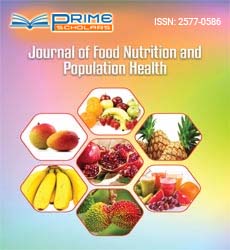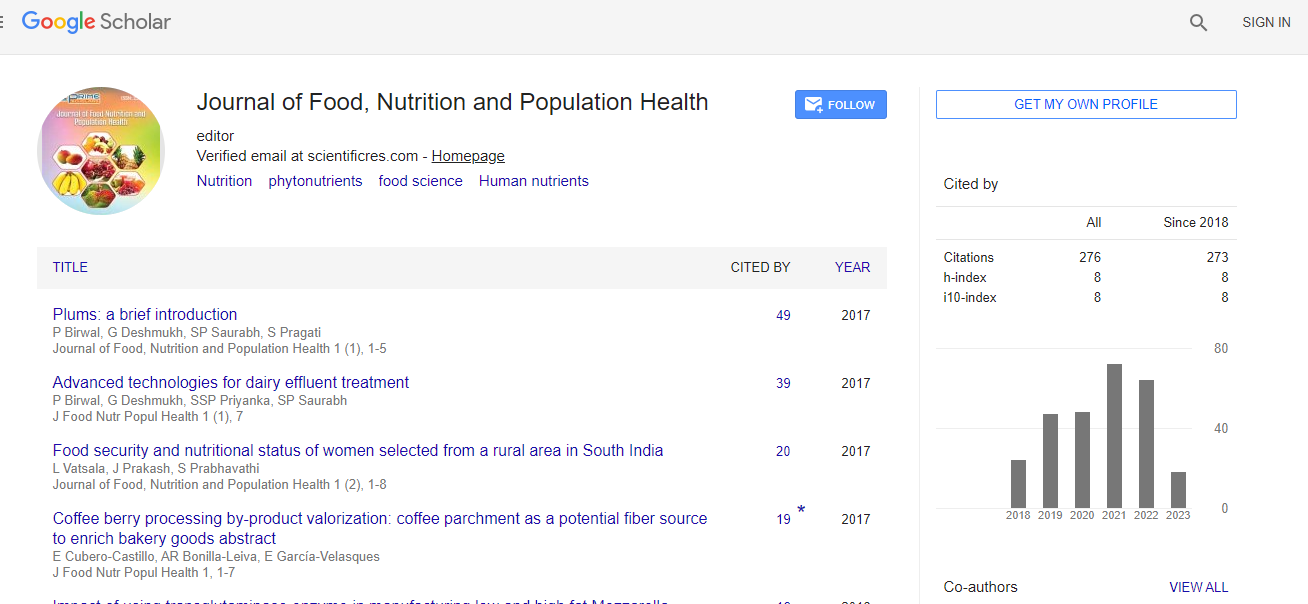Opinion - (2023) Volume 7, Issue 2
Association between Nutritional Quality and Obesity
Yuelong Jin*
Department of Food Quality, University of Toronto, Canada
*Correspondence:
Yuelong Jin,
Department of Food Quality, University of Toronto,
Canada,
Email:
Received: 30-May-2023, Manuscript No. ipjfnph-23-16811;
Editor assigned: 01-Jun-2023, Pre QC No. ipjfnph-23-16811 (PQ);
Reviewed: 15-Jun-2023, QC No. ipjfnph-23-16811;
Revised: 20-Jun-2023, Manuscript No. ipjfnph-23-16811(R);
Published:
27-Jun-2023, DOI: 10.21767/2577-0586.7.02.20
Introduction
This study examined the associations between diet quality,
obesity, and treatment-emergent adverse events in patients
with breast malignancies undergoing treatment. Most of them
received chemotherapy alone and had median treatment duration
of less than 9 months. Use of whole grains, dairy products,
and unsaturated fats was low in this review. This finding
was predictable in previous studies. Avoidance and retention
of certain types of food is normal in patients with malignancies.
This may stem from the belief that animal products are responsible
for amelioration of disease or treatment-related squeal
that alters taste judgments. Dairy products, on the other hand,
are not an everyday allotment for Malaysians. This may also be
due to the low consumption of dairy products among patients.
Dairy is a major hotspot for the proteins, multivitamins and
minerals that underlie normal body processes, but patients
with breast disease often avoid dairy products due to health
concerns associated with the use of chemicals in animal products.
The World Malignant Growth Exploration Asset examined
the magnitude and pattern of the effect of dairy products on
disease risk differed by site of malignancy, including tumors of
the prostate, breast and colon. Further research is expected to
confirm the effects of dairy products, especially on breast malignancies.
During treatment, sick patients experience various
side effects. Despite our familiarity with smart diet practices,
our ability to maintain a sensible eating routine can be compromised.
These two parts give an indistinguishable translation.
Patients with breast disease prefer refined grain products with
softer surfaces as opposed to whole grain products. White rice,
white bread, or any food made from white flour.
Description
Relative to the proportion of unsaturated fatty acids, a low
score begins with inadequate utilization of monounsaturated and polyunsaturated fats. The peculiar portion of the soaked
fat reflected that the patient restricted a diet high in soaked fat
but did not follow the unsaturated fat regimen. However, reliable
results have been reported that closely match the intake of
soaked unsaturated fatty acids. Polyunsaturated fats from marine
sources have been suggested to enhance treatment-related
squeal and further enhance therapeutic relevance through
anti-tumor effects. Apart from soaked unsaturated fats, it is
important to monitor the patient’s intake of unsaturated fats,
especially during treatment. The biggest obstacle to meeting
healthy fat recommendations may be the high cost of food. For
example, margarines with less soaked fat are more expensive
than spreads with more soaked fat. Also, Malaysians rarely eat
raw vegetables and natural products in combination with oilbased
dressings.
Conclusion
Recent results have shown that better dietary habits are effective
in preventing obesity in patients with breast malignancies.
General health research has generally revealed an equivalent
relationship between diet quality and muscle strength. On the
other hand, the association between diet quality and risk of
malignancy or mortality could not be predicted. Since malignant
growth is a multisite disease with different therapeutic
modalities, the relationship between diet and disease prognosis
needs to be investigated for different disease types, and
improving the quality of disease site-specific diets is important.
It is thought that there is. Obesity is not a beneficial outcome
for patients with malignancies who are commonly considered
malnourished, as previous studies have shown the detrimental
effects of obesity on a patient’s personal well-being and endurance.
Adopting a smart diet should be a lifestyle staple for
achieving normal weight levels and maintaining decent overall
health.
Citation: Jin Y (2023) Association between Nutritional Quality and Obesity. J Food Nutr Popul Health. 7:20.
Copyright: © 2023 Jin Y. This is an open-access article distributed under the terms of the Creative Commons Attribution License, which permits unrestricted use, distribution, and reproduction in any medium, provided the original author and source are credited.

